Liam Kelly
2023 Pegasus Scholar Report
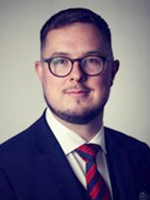 Eleanor Roosevelt's once said: "True hospitality consists of giving the best of yourself to your guests." This sentiment encapsulates the genuine warmth and generosity shown by all those I've encountered throughout my Pegasus Scholarship which has seen me visit Arizona, California, Colorado, Nevada, Maryland, Utah, Virginia, and Washington D.C (some States more fleeting than others). Their hospitality has left an unforgettable impression and has made my scholarship truly unforgettable.
Eleanor Roosevelt's once said: "True hospitality consists of giving the best of yourself to your guests." This sentiment encapsulates the genuine warmth and generosity shown by all those I've encountered throughout my Pegasus Scholarship which has seen me visit Arizona, California, Colorado, Nevada, Maryland, Utah, Virginia, and Washington D.C (some States more fleeting than others). Their hospitality has left an unforgettable impression and has made my scholarship truly unforgettable.
Before heading out on my scholarship, I was asked to write a profile for the American Inns of Court setting out my experience and what I hoped to learn more about whilst in the U.S. As a family lawyer, I wanted to understand more about key issues within my practice area (division of assets upon divorce & domestic violence, drugs, and alcohol), but also more about legal education and the culture and heritage of the U.S. I can confidently say I've had plenty of opportunity to dive into these issues and more, and it seems appropriate to frame my review using these topics.
Legal Education
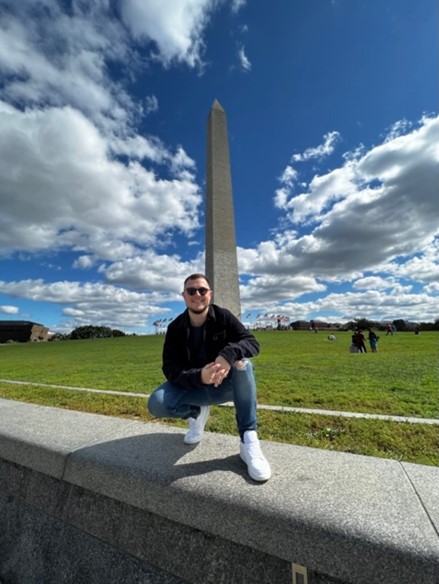 Pegasus Scholarships undertaken in the USA are run as a partnership between the English Inns of Court and the American Inns of Court. Unlike the English Inns, the American Inns of Court is relatively new having been founded in 1980 following a visit by Chief Justice of the United States Warren E. Burger, as part of an Anglo-American exchange, who sought to replicate the British system. Whilst relatively modern, the American Inns of Court’s vision, “A legal profession and judiciary dedicated to professionalism, ethics, civility, and excellence through education, and mentoring” shares many values of the English Inns. Unlike the 4 English Inns, there are over 300 separate Inns in the American Inns of Court, some which are generic and some which are specialised by practice area, or even type of work.
Pegasus Scholarships undertaken in the USA are run as a partnership between the English Inns of Court and the American Inns of Court. Unlike the English Inns, the American Inns of Court is relatively new having been founded in 1980 following a visit by Chief Justice of the United States Warren E. Burger, as part of an Anglo-American exchange, who sought to replicate the British system. Whilst relatively modern, the American Inns of Court’s vision, “A legal profession and judiciary dedicated to professionalism, ethics, civility, and excellence through education, and mentoring” shares many values of the English Inns. Unlike the 4 English Inns, there are over 300 separate Inns in the American Inns of Court, some which are generic and some which are specialised by practice area, or even type of work.
As part of my Scholarship, I had the opportunity to visit three different Inns, The Anthony M Kennedy Inn, in Sacramento, California, the Earl Warren Inn of Court, in Oakland, California, and the Sutherland II Inn of Court, Salt Lake City, Utah. Members of each American Inn of Court meet once per month at their respective Inn to undertake continuing education, usually in the form of a “skit”. A skit is a short piece of drama addressing a legal or ethical issue which is performed by a team of members of the Inn, with each team performing one skit per year. The skits are interspersed with discussions from the wider audience about the topics raised which fosters participation, and engagement with continuing education. Whilst skits are a world away from how continuing education is traditionally undertaken here at home, what we do have in common is the coming together to share dinner and drinks and to share experiences from which others can learn.
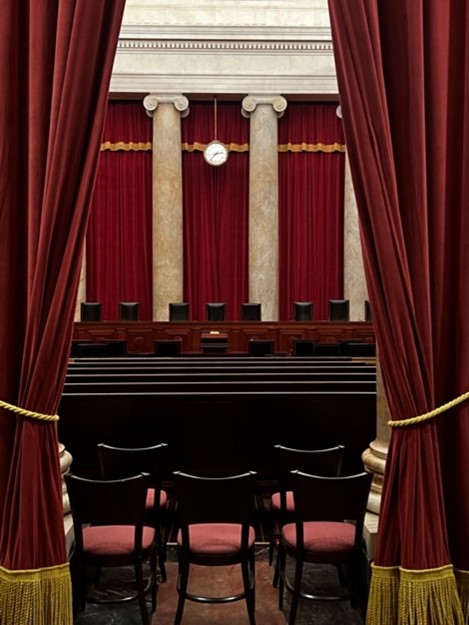 As part of my programme, I had the opportunity to attend the American Inns of Court Celebration of Excellence; an annual awards ceremony hosted at the Supreme Court of the United States (SCOTUS). This was my first time at SCOTUS, and it is hard to describe just how grand a setting it is with its sweeping marble columns, and red velvet drapes. Seated on the front row, we watched the ceremony as those who have made significant contributions to the American Inns of Court and wider legal community in the U.S. were recognised, before photographs in the Lawyer’s Lounge, and dinner in the Great Hall. The event was also attended by members of my Inn, Inner Temple, and it was great to catch up with Greg Dorey and Rehana Popal amongst others.
As part of my programme, I had the opportunity to attend the American Inns of Court Celebration of Excellence; an annual awards ceremony hosted at the Supreme Court of the United States (SCOTUS). This was my first time at SCOTUS, and it is hard to describe just how grand a setting it is with its sweeping marble columns, and red velvet drapes. Seated on the front row, we watched the ceremony as those who have made significant contributions to the American Inns of Court and wider legal community in the U.S. were recognised, before photographs in the Lawyer’s Lounge, and dinner in the Great Hall. The event was also attended by members of my Inn, Inner Temple, and it was great to catch up with Greg Dorey and Rehana Popal amongst others.
During my visits to various law schools, including Georgetown University and Howard University in Washington DC, and the McGeorge School of Law at the University of the Pacific in Sacramento, I gained insights into the structure of legal education in the United States. It's noteworthy that America's legal profession operates as a blended practice, with attorneys handling the full spectrum of legal work, including advocacy.
A key distinction from the UK legal education system is that in the U.S. law is not an undergraduate degree; it is exclusively pursued as a three-year postgraduate degree on a full-time basis or a four-year part-time basis. American legal programs place a significant emphasis on developing advocacy and practical skills, such as drafting, in contrast to the UK where these skills are typically taught during postgraduate study on the bar course.
Notably, once an American student graduates and passes the Bar, there is no mandatory period of supervised work, akin to pupillage. While many new attorneys undergo supervision within their firms, others choose to establish themselves in self-employed practice from the outset. This distinction reflects a key divergence between lawyers in the two legal systems.
Family Law Issues
It is impossible to consider everything within this short review, so I have decided to consider two issues that piqued my interest during my time in the U.S. First, the doctrine of “community property” in divorce proceedings, and secondly the “right to confrontation” which has seeped into family law proceedings.
In the United States, the distribution of property following a divorce is not governed by a single system, as family law is regulated by state laws rather than federal law. Consequently, two primary doctrines for the division of assets exist: the common law property distribution, often referred to as "equitable distribution," which bears similarities to property distribution in England and Wales, and the community property distribution, applied in California and eight other states.
In essence, the community property doctrine operates on the presumption that most property acquired during the marriage is deemed "community property," jointly owned by both spouses, resulting in an automatic 50% distribution to each party upon divorce. This stands in contrast to the established doctrines in England and Wales, such as needs, sharing, and compensation. Community property extends its application to liabilities, equally assigning responsibilities to each party. While this distribution may influence alimony or spousal maintenance as it is known here in the UK, it entirely excludes separately owned property. Consequently, one party may be left without a share in assets like the family home, especially pronounced in lengthy marriages where the home was acquired before the marriage. Similarly, a business owned by one party, made feasible by marital sacrifices, may also be exempt from distribution.
Furthermore, unlike the separate applications for divorce, financial remedies, and child arrangements in England and Wales, filing for divorce in most U.S. states allows the court to address all family-related matters in a comprehensive manner. This holistic approach offers distinct advantages, facilitating a thorough consideration of all relevant issues related to the family.
Beyond divorce matters, domestic violence is prevalent in U.S. family law proceedings, mirroring the broader societal issue. A distinctive aspect, however, lies in the application of the VI Amendment, a constitutional right known as the "right to confrontation." While originally framed in the context of criminal law, my observations of family law trials suggest that the right to confrontation is pervasive within these proceedings. This means that it's not uncommon to witness alleged victims of domestic abuse being directly confronted by their alleged abusers through cross-examination. Unlike at home, there is no provision for protective measures such as participation directions, compelling alleged victims to directly face their alleged abusers in court.
Culture and Heritage
The United States is a vibrant mix of diversity, and amidst the packed schedule of meetings and visits during my scholarship, I made sure to embrace the chance to experience American culture and explore outside our formal program.
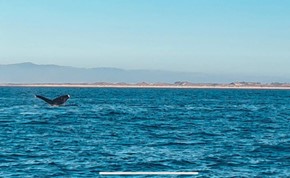 In Sacramento, I took on the challenge of driving on the other side of the road to reach Monterey Bay and Carmel, a stunning coastal town in Northern California. Despite locals warning about typically grey and misty weather, we lucked out with a beautiful weekend. My co-scholar, Danielle, and I went whale watching, spotting seals, sea otters, and dolphins. After some patience, we spotted humpback whales preparing for their southward migration. Thanks to our generous hosts, Carole and Parker, we celebrated Danielle's birthday in Yosemite National Park and spent a weekend at Lake Tahoe. Our tour of San Francisco included iconic spots like the Golden Gate Bridge and Lombard Street, and, of course, a ride on the famous streetcar.
In Sacramento, I took on the challenge of driving on the other side of the road to reach Monterey Bay and Carmel, a stunning coastal town in Northern California. Despite locals warning about typically grey and misty weather, we lucked out with a beautiful weekend. My co-scholar, Danielle, and I went whale watching, spotting seals, sea otters, and dolphins. After some patience, we spotted humpback whales preparing for their southward migration. Thanks to our generous hosts, Carole and Parker, we celebrated Danielle's birthday in Yosemite National Park and spent a weekend at Lake Tahoe. Our tour of San Francisco included iconic spots like the Golden Gate Bridge and Lombard Street, and, of course, a ride on the famous streetcar.
In Utah, we kicked off the week horse riding against the stunning backdrop of the Wasatch Mountains. Later in the week we visited Park City to get a glimpse of snow-covered mountain tops. Two nights in Las Vegas marked a drastic shift from the conservative culture of Utah.
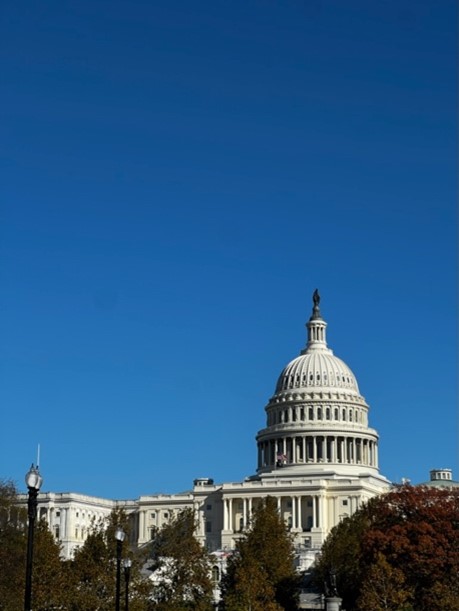 Then came Washington DC, the nation's capital, with its historic monuments and museums showcasing the U.S’s history and diversity. As a first-time visitor to DC, the grandeur of monuments dedicated to civil rights leaders and presidents was truly spectacular. A personal highlight was a visit to the Archives of the United States, where we got an exclusive view of the Declaration of Independence, the Constitution, and the Bill of Rights before the usual crowds arrived.
Then came Washington DC, the nation's capital, with its historic monuments and museums showcasing the U.S’s history and diversity. As a first-time visitor to DC, the grandeur of monuments dedicated to civil rights leaders and presidents was truly spectacular. A personal highlight was a visit to the Archives of the United States, where we got an exclusive view of the Declaration of Independence, the Constitution, and the Bill of Rights before the usual crowds arrived.
Summary
My Pegasus Scholarship has been a truly once in a lifetime experience which would not have been possible without the Pegasus Trust or American Inns of Court’s commitment to the program. My thanks go to Cindy Dennis and our hosts Ellen and Tim DelSole, Art Scotland, Carole McCook and Parker White, and Larisa Lee for whose hospitality I will be forever grateful.
Liam Kelly is a barrister at Deans Court Chambers, Manchester, and practices in all areas of family law with specific focus on disputes between separating families. His work includes the division of matrimonial assets upon divorce, disputes as to property between unmarried couples, and disputes arising in respect of children, including international child abduction pursuant to the Hague Convention. In addition, Liam maintains a public law practice and has appeared in the Court of Appeal and High Court in recent years. Liam is a regular contributor to the Family Law Journal and other industry publications. He was shortlisted for the Family Law Awards 2021 Young Barrister of Year and Young Pro Bono Barrister of the Year 2022.
Liam has a keen interest in human rights and has given evidence to the Joint Committee on Human Rights, a Select Committee of the UK Parliament, on freedom of speech in universities, and was later cited within their final report. He has represented learning disabled parents’, including in the Court of Appeal in respect of breaches of a parents Article 6 and Article 8 rights pursuant to the European Convention on Human Rights: D (A Child) [2021] EWCA Civ 787.
Prior to becoming a barrister, Liam worked in Business Process Outsourcing both in the UK and overseas in Asia. He read Law at the University of Leeds from 2015 and was awarded the William James and Mary Spence Award as the most promising final year student in the School of Law upon graduation in 2018. He went on to complete his professional training and LLM in Legal Practice at BPP University, Manchester, and was awarded an Advocacy Scholarship and Programme Leader’s Award. He was awarded a Major Scholarship and Duke of Edinburgh Entrance Award by the Inner Temple.
Liam is a member of the Bar Council’s Education and Training Committee and is passionate about education for future barristers. He continues to contribute to Inner Temple’s outreach work to encourage those from underrepresented backgrounds to consider a career in the law, and regularly speaks at events hosted by universities and his chambers.